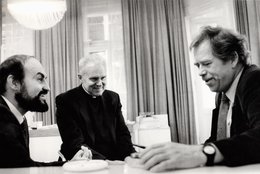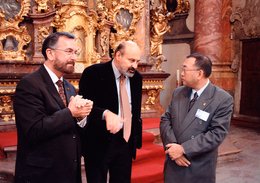(Excerpts from Tomas Halík, Patience with God, Doubleday, New York – London, 2009, pp 113-121)
Several years ago extensive research was carried out into the value orientation of contemporary Europeans. One of its theological commentators wrote: “God is no longer a self-evident God and has become an alien, unknown God.” I reacted to it in a lecture, in which I asked myself and my listeners the question whether this does not represent a great and so far unused opportunity for Christianity. I recalled the well-known scene from the Acts of the Apostles of Paul’s sermon at the Areopagus in Athens. Paul first praises the Athenians for their devoutness in erecting altars to so many gods, so that they even remember “an Unknown God”, whose altar had particularly intrigued him when he was strolling through the sacred garden. Bible commentators continue to argue over whether these words of praise for “pagan idolatry” – quite unusual from the lips of a devout Jew – were a rhetorical “captatio benevolentiae” (an attempt to win the listeners’ favor) or instead an expression of caustic irony. Paul proceeds to interpret this “Unknown God”: “What therefore you unknowingly worship, I proclaim to you.” This god is not one of the gods that was perhaps forgotten and so is to be honoured just to be on the safe side, to prevent him showing anger and taking vengeance; it is the Creator and Lord of heaven and earth. Immediately afterwards there comes Paul’s critique of idolatry – this God does not dwell in material temples and requires no human rituals; after all divinity is not some human artefact or material object. Idolatry, Paul says, is an expression of ignorance. God had long tolerated this immature attitude, whereby people related to Him, but now the situation had changed radically and the time had come for repentance. Paul talks about the Greeks’ worship of gods in a similar spirit of censure and irony as used by the prophets of Israel or by the ancient philosophers when criticising primitive religious anthropomorphism. Nonetheless he finds for them a certain time-contingent tolerance; maybe he implicitly accepts the “period of ignorance” – the era of pagan religions – as a kind of pedagogical preparation for the coming of Christ, rather in the way he refers in his letters to the Law of Moses. Here he speaks about the true God, the one unknown to the Greeks, more in philosophical categories and in terms of poetic piety (eusebeia), than in terms of religion as a cult. His speech to the Athenians, with its references to the Greek poets, might even recall a certain sort of pantheism or, at the very least, panentheism: “he is not far from any of us,” Paul says, “For in him we live and move and have our being... For we too are his offspring.” Paul, however, preaches God the Creator – this God created the world and its order (“he fixed the ordered seasons and the boundaries of their regions”) – in order to provoke people’s religious search “so that all nations might seek the deity and, by feeling their way toward him, succeed in finding him.” This is a very powerful assertion: that the purpose of creation is a religious quest! There is something else we should note, though: an “Unknown God” is not a distant God. On the contrary he is incredibly close to us: “in him we live, and move.” He is unknown not because he is too far away but because he is too close. After all, we know least of all about what is closest to us, what is most proper to us, what we take for granted. None of us has seen our own face – we only see its image in a mirror. And we can only see God in a mirror; elsewhere Paul states in so many words that during our lives we see God only partly: “indistinctly, as in a mirror”, but after death we will see him “face to face”. Paul wants to show the Athenians the “face” of the unknown God, who is too close, as mirrored in the story of Jesus of Nazareth, above all his paradoxical climax: the cross and resurrection. But he does not get that far. When Paul says the words “resurrection from the dead” some of the Athenians start to sneer, while others walk off, having lost interest: they have understood the resurrection as something they were naturally familiar with, whether as an absurd fable, or as a frequent image in the mythology of the surrounding nations, where gods frequently died and rose from the dead; the Greek gods, however, enjoy one – and often only one – privilege not accorded humans, and which sets them apart: their immortality. I will reflect later on how Paul’s sermon about the face of God in the mirror of the Easter story might have continued. For the moment, let us linger a bit more at the “altar to an Unknown God.” Is the fact that the apostle starts his sermon by referring to the “Altar to an Unknown God” simply a sign of Paul’s oratorical quick-wittedness, or does it mean something more? I am sure that what happened on the Areopagus is paradigmatic in its way. “The Altar to an Unknown God” is precisely the most appropriate “topos” for proclaiming the Christian message. For Paul, as a Jew and a Christian, the only true God is the God that can’t be portrayed, one hidden in mystery. A known god is no god at all. It is not surprising that the ancient world – a “world full of gods” – for centuries regarded the Jews and Christians as atheists. I am convinced that if anyone wants to preach the Good News of the paradoxical God of the Bible, he has to find the “altar to an Unknown God”. To speak about Christ at the altar to familiar gods would be blasphemy or risk even greater misunderstanding than on that occasion at the Athenian Areopagus. The world is full of familiar, known gods. Martin Luther said rightly that whatever people assign the greatest value to is their god. Paul himself wrote about “greedy people” as “idolaters” who have “no inheritance in the kingdom of Christ and of God. The thought occurs to me whether we Christians have not in the course of history constantly fallen prey to the temptation to exchange the paradoxical God of Christ’s Easter story for a “familiar god” conforming to the human notions and expectations of specific epochs. Wasn’t the identification of the Biblical God with the god of the ancient philosophers as described by Plato and Aristotle – so fateful for the history of Christian theology – precisely one of those substitutions? And if this has happened, and our Christian thinking is burdened with this legacy, then is not much of what we call secularisation, criticism and undermining of religion, atheism, etc., no more than taking leave of the familiar, known gods and thus a great opportunity to clean and open up a space in which we may hear anew Paul’s message? Is not the situation in which, for a large proportion of Europeans, God is an unknown and alien god, a summons to a “new Areopagus”?
In my lecture at that time, in place of an answer I offered another story that was written eighteen centuries after Paul’s sermon on the Areopagus. In some respects it is strikingly similar to the scene from Acts and in others quite the opposite. Paul, as we heard, left the Areopagus having persuaded most of his crowd of listeners that he was a madman. To another crowd, in another marketplace, comes another madman to speak about an unknown god. In the chapter entitled “Madman” (Der tolle Mensch) of Friedrich Nietzsche’s “Gay Science” a man comes searching for God in the daylight with a lantern, like Diogenes searching for man, but, unlike Paul, he comes among those who do not believe in God. Maybe they still talk about him, maybe they even continue to attend his churches (which the Madman quickly declares to “mausolea of the dead god”) but in reality they are not concerned with him at all and they don’t miss him in the least. This detail in that well-known and celebrated text is often overlooked: the Madman, who comes as a herald of God’s death, comes to provoke not believers but unbelievers – Nietzsche uses his message to question their matter-of-fact atheism. The people mock the seeker after God, because they have long ceased to seek Him. “Is he hiding? Is he afraid of us? Has he gone on a voyage?”, they scoff at the mad seeker from their standpoint of the certainties of “practical atheism” And they cannot understand at all his plaintive message about why there is now “no God”: “We have killed him, you and I!” Those for whom God simply does not exist, who is not and never was, and those for whom – with equal matter-of-factness – God has “existed” from the beginning of time as an unchanging metaphysical entity, must necessarily find the message about the death of God equally insane and incomprehensible as the Athenians did Paul’s message of the resurrection. It was possible to remind the Athenians that divinity was the most intimate part of their Lebenswelt, so close and commonplace that they don’t even notice it any more, just as we are unaware of the smell of our home when we are in it all the time. Europeans on the post-modern market-place would be told that they no longer live in the sacrosanct – God’s absence (concealed by unthinking conventional atheism or conventional religiosity) has become so axiomatic to them that its cause and effect need to be demonstrated dramatically. “All of us are his murderers. But how did we do this? How could we drink up the sea? Who gave us the sponge to wipe away the entire horizon? What were we doing when we unchained this earth from its sun? [...]Whither are we moving?” The herald of the death of God in Nietzsche’s story does not come in order to bring about his listeners’ conversion to atheism, to turn them into atheists at last, perhaps. They are up to their ears in atheism, although they are obviously unaware of it, because God doesn’t interest them. The Madman, the Fool – the only person traditionally permitted to speak unpleasant truths comes instead to arouse in them responsibility for the unacknowledged or forgotten reason for their atheism. The Madman (and Nietzsche in his guise) is not seeking to “propagate” atheism and bring about the death of God in the minds of his listeners, but has instead come to spread the news that this event has already occurred and to explain its meaning; he wants his listeners to realise how fundamentally this event concerns them. They are the joint-victims and joint-perpetrators of the death of God. This deed, apparently committed unwittingly, casually, or at the very least thoroughly displaced into the unconscious, is “too great” for its perpetrators to accept and to grasp its shocking implications either as a fault for which they must accept responsibility or even as a liberating opportunity that they have to seize; they are quite simply incapable of understanding the message at all. The Madman is mad because he came too early – thus spake Nietzsche, who undoubtedly identified with this figure whose prophecy was ahead of its time. In his time “ears had not yet grown” for this message.
Our ears are full of the tidings about the death of God that have been repeated over and over again since Nietzsche. But what sense have we made of them – and what conclusions have we drawn from the message? Few sentences admit such a wide range of different and often contradictory interpretations. In the “Gay Science” itself, Nietzsche hints at its ambivalence. In the Madman’s sermon, the tragic consequences of God’s death tend to be stressed: we are hurtling into a dark space far from all suns; we have lost our bearings and the horizon; we don’t know what is up and what is down. We no longer know, nor can we, what is good and evil. The tablets of the old values have been smashed. But in an earlier chapter of the same work Nietzsche perceives the death of God as an enormous opportunity: now we can set sail freely on the open sea. The void demands to be filled, the empty throne beckons and invites new candidates to take up the mantle of the old God. Nietzsche introduces one of them: superman. The point is that the death of God also represents the death of man, the end of the existing type of humanity and humankind. A new human must come – a new God or a new “God-Man”? Nietzsche is amazed that no new god has arrived after so long. The death of God – as another of his texts suggests – could only mean that “God has shed his moral clothes”. Maybe we shall see Him once again, Nietzsche prophesies – this time beyond good and evil. Will Nietzsche ever see his god “that could dance”?
During the period since Nietzsche’s death on the very threshold of the 20th century many “new gods” have made their appearance and there have been many attempts to present a “new man” or superman. One might even say that the century in which atheism and religious apathy – in a large part of Europe, at least – spread as never before, was also a period when “new gods” and various versions of a “new man” were mass-produced. I don’t think Nietzsche would have said to any of them in a joyful spirit in the words of his compatriot Goethe “Verweile doch, du bist so schön”. I wonder whether, even at this time of flourishing religion and the “return of God” to the great home of our civilization, which is the subject of so much discussion, whether it is not the return of the old destructive gods or cheap imitations of religion. What I value about our epoch is more its thirst than the beverages that it often tries to slake it with, its questions more than the answers that tend to be proposed. Aren’t they above all the old familiar gods that are again in play? If I had to address Zacchaeus today I would once more seek with him the “altar to an unknown god”. I would tend to seek him in a space cleansed by the process of secularization and religious critiques of recent times rather than in today’s bustling, motley, religious marketplace. And I would not be able to say anything other at that altar than what Paul proclaimed – maybe in slightly different words – in Athens long ago. That unknown god is unknown to us because we don’t look for him in the right places. We seek him among the gods of this world, among philosophical constructs, projections of our own desires and fears, among “supernatural beings” and fruits of our imagination. We seek him among the ancient gods “behind the scenes” of the world in some heavenly managerial office of our destinies. We seek him like the deists of early modern times in some engineering shop for the manufacture or repair of the cosmos. But he is not anywhere there. We can’t see him because he is too close. He is not a being far above us; he is the depths of our life, he is in our being, “we live, breathe, move and are in him.” Things that are very close to us are easy to overlook. But he is not “close” to us, he is the closeness itself. We can still see close objects but we can’t see closeness itself. We see objects in light – we do not see the light itself. If we don’t even see our own faces, but only see their reverse reflection in a mirror, as was noted earlier, how could we possibly see the face of God? And then – like Paul at the Areopagus – I would try to show that “God’s face” is only accessible to us in mirrors and riddles. It is visible in the mirror of Easter, in the story of Jesus of Nazareth, in that great riddle that was set for us all. Would Zacchaeus have greater patience to follow the story to the end than the citizens of Athens at the Areopagus that time? That is the question.



